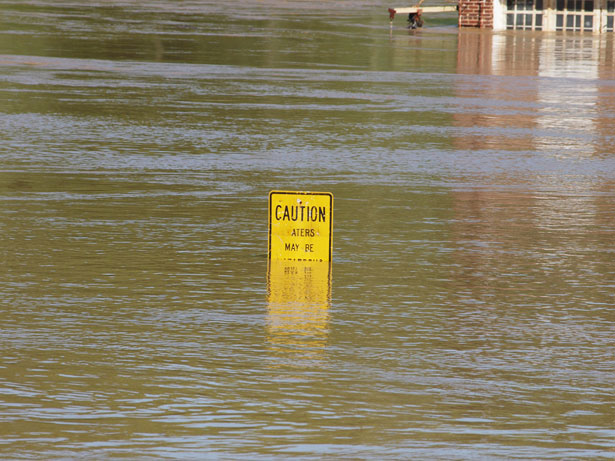Níl tuile dá mhéad nach dtránn: Vocabulary for discussing the floods in Ireland Posted by róislín on Jan 4, 2016 in Irish Language
(le Róislín)

Cén Ghaeilge a bheadh ar an bhfógra seo? Tá sé deacair an focal fada faoi “MAY BE” a léamh ach sílim go ndeir sé “dangerous.” Sin ‘contúirteach’ nó ‘baolach’ nó ‘dainséarach’. Seo pictiur den Duck River i dTennessee i Meiriceá. (http://www.publicdomainpictures.net/view-image.php?image=11738&picture=duck-river-flood)
Like many people, I’m very concerned about the amount of flooding in Ireland. Not being any sort of innealtóir sibhialta, hidreolaí, or céad fhreagróir, I think the most I can to is “mo chuid imní a léiriú” and provide some vocabulary for discussing the situation.
First, let’s start with the word for flood, and then we’ll do a few related phrases.
tuile, a flood; ex: tuile bháistí, a downpour of rain
an tuile, the flood; an tuile rua, the deluge, lit. the red/intense flood (but that’s still not the same as “An Díle“. Which means …? Féach an freagra thíos ag bun an bhlag.
tuile, of a flood (same as the basic form); ex: bacainn tuile, a flood barrier
na tuile, of the flood; le trá na tuile, with the fall of the flood (the receding of the water)
tuilte, floods, ex: Beidh tuilte ann mar gheall ar an fhearthainne, There will be floods because of the rain.
na tuilte, the floods; ex: Fágfaidh na tuilte an baile faoi uisce, The floods (flooding) will leave the town under water, i.e. will drown the town
tuilte, of floods; ex: in aghaidh tuilte, against floods, as in “árachas in aghaidh tuilte,” insurance against floods, or “rialúchán tuilte,” flood control, lit. control of floods
na dtuilte, of the floods, ex: i ndiaidh na dtuilte, after the floods, lit. in the wake/trail of the floods (that’s how “of the” comes in)
For relative newcomers to the language, remember the “ui” vowel sound is more like the “i” of English “is” or “it.” The “u” is essentially silent, serving mostly to keep the “t” broad. This “ui” pronunciation shows up in many everyday words in Irish, such as “duine” and “bhfuil.” And the final “e” is pronounced, albeit unstressed. This is a major difference from spelling in English, where most final “e’s” are silent (as in “cane” or “lake”). In “dtuilte,” the “t” is eclipsed (covered over), so it is silent.
“Tuile” is also the verbal noun of the verb “tuil,” so it can be used to say that a river is flooding (Tá an abhainn ag tuile) or that the tide is overflowing (Tá an taoide ag tuile).
Now some more examples :
tuile dheor, a flood of tears
sruth tuile, flood-tide
damáiste ó thuilte, flood damage, lit. damage from floods; note the use of the preposition
maidhm tuile, a flash flood; a completely different word, “tulca,” also means “flash flood”
tuilemhá, a flood plain (tuile + m(h)á); this “mh” has a “w” or “v” sound, depending on dialect
bóthar faoi thuile, road flooded (writing you might see on a road sign)
Baol Tuilte, danger of flooding (i.e. the road is liable to flooding)
Tá tuile san abhainn, The river is in flood
Tá an tuile ag trá, The flood is receding, from the verb “tráigh”
And how about a few other words connected to flooding , to match up. They’re fairly clear-cut, I’d say, so I think they’ll sort themselves out without an answer key.
- leibhé a. high water mark
- mála gainimh b. silt
- damba c. levee
- siolta d. sand bag
- líne bharr láin e. dam
And, to wrap up, let’s use a seanfhocal to introduce a seanfhocal, since, after all, “Ní sharaítear seanfhocal.” Here is a flood-related one:
Níl tuile dá mhéad nach dtránn, lit. there isn’t a flood, however big, that doesn’t recede, or more flowingly, All floods eventually recede. In other words, bad scenarios don’t last forever.
Hopefully that seanfhocal will provide some source of hope or comfort. SGF, and “misneach” to the people affected. — Róislín
Nóta: The difference between “An Díle” and “an tuile rua“? “An Díle” (note the upper-case letters) is the Biblical Flood and tuile rua” simply refers to an intense flood or deluge. We may also see “an díle” (lower-case) sometimes for a general deluge or flood but in my experience, “tuile” is the more general term, sometimes intensified by “mhór” or “rua” or some other adjective, and “An Díle” is capitalized and refers to the Biblical Flood.

Build vocabulary, practice pronunciation, and more with Transparent Language Online. Available anytime, anywhere, on any device.




Comments:
Bryan S:
“… an aimsir láithreach, le TG4”. Finally I know the seanfhocal TG4 quote before every réamhfhaisnéis na haimsire! GRMA arís a Róislín.
róislín:
@Bryan S Tá áthas orm gur chuidigh sé! Mar a dúirt mé, “Ní sharaítear seanfhocal,” agus sin ceann de na seanfhocail is fearr liom.